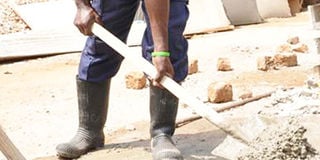Cement: The silent killer

Constant inhaling of cement will lead to a number of ailments. But most of these can be prevented through taking precautions.
What you need to know:
Thousands of construction workers are exposed to concrete every day without harm. But anyone who uses or supervises the use of cement should know its health hazards and the safe working procedures necessary to minimise exposure.
With the boom in construction in the country over the last 20 years, thousands of workers in the construction industry and the corresponding support businesses are exposed to cement dust on a daily basis. While it is mandatory in the law for factory workers to be accorded protective gear such as thick gloves, safety hats, and gum boots, those who work in hardware shops or on building sites are not so lucky.
Effects
On the surface, it would appear that beyond an irritation to the eyes and nasal cavity, there is no health hazard associated with continual exposure to cement. However, this was not the case with Sarah Nabukeera* who for more than 10 years ran a busy hardware shop whose primary item of sale was cement. She spent about 10 hours inside the shop every day. Then, at the start of 2017, she began falling sick. “She developed a cough but a few weeks after taking bottles of syrup and throat lozenges, she realised the cough was getting worse,” Eric Kiryowa, Nabukeera’s nephew, narrates.
Nabukeera was then admitted in hospital for more than a month. After inconclusive tests, the family took her home. Because she was losing weight daily, Kiryowa and his relatives thought she had HIV. “We took her to a hospital that specialises in HIV treatment. The tests, however, were negative and we were referred to Mulago hospital,” Kiryowa says.
The diagnosis
A doctor at the national referral hospital asked the family to consent to a biopsy and the results showed Nabukeera was suffering from stage four lung cancer.”
It may seem far-fetched that cement dust can cause lung cancer.
However, Dr Francis Uzu Ekwan, a principal occupational therapist at Mulago hospital, says whoever works in a cement factory or hardware shop should understand that there are health hazards associated with the job.
“In these workplaces, silicate (found in cement), dust, and cement are dangerous although their effects on a worker may only manifest after many years of exposure. However, in the short term, exposure to cement dust can cause irritation to the skin, difficulty in breathing, coughing and chest pain.”
Rogers Nuwagaba, an employee of Paradise Agent Limited, has worked with cement for one year and eight months. “Besides carrying bags of cement, sometimes, I have to measure it for customers who do not want to buy a full bag. I inhale cement dust everyday and by the end of the day, it feels like the dust is logged in my throat. When I spit, the phlegm is dark.”
Bronchitis
People, who do not have a robust immune system, will likely develop on-and-off acute bronchitis due to prolonged exposure to cement dust. Acute bronchitis inflames the lungs and causes coughing, wheezing and shortness of breath. “Bronchitis is a warning sign that a condition in the lungs could later develop into cancer,” Ekwan warns.
“This is especially so for smokers who are also exposed to cement, because of the multiple risk factor.”
Damaging organs
In hardware shops, for instance, it is rare for the workers to close shop and go for breakfast or lunch. Usually, food is brought into the shop. “When cement is swallowed, it puts organs such as the stomach, kidney, and heart at risk. Prolonged exposure could also lead to stomach cancer,” Ekwan says.
Skin conditions
Constant exposure to cement can lead to dry skin and itching. Wet cement also burns the skin. Nuwagaba says the dust blocks his skin pores but since joining the gym, sweating has helped to reduce the risks.
Labour laws
Ministry of Gender, Labour and Social Development (MGLSD) implements labour laws that oversee the welfare of workers in factories. However, these labour laws seem not to be adhered to in hardware shops and some construction sites.
“Occupational wellbeing should a multi-pronged responsibility involving MGLSD, Ministry of Health, and National Environmental Management Authority (NEMA),” Dr Francis Uzu Ekwan, a principal occupational therapist at Mulago hospital Ekwan says, adding, “Corporate entities are mandated to disseminate information about the dangers of exposure to cement but small businesses are ignorant of these laws.”
Because the effects of inhaling and swallowing cement dust manifest over a period of time, it is not easy to peg an illness to a direct exposure incident. “The disease may come after the person has moved on and settled into another job,” Ekwan says.
Precautions to take
Business owners should advise their workers on best hygiene practices. For instance, a cement worker’s clothes should not be washed together with the clothes of other family members. These work clothes should be carried home in a separate tightly sealed bag.
“Besides protective gear, workplaces should be well ventilated,” Dr Francis Uzu Ekwan, a principal occupational therapist at Mulago hospital says, adding that if a worker’s skin gets into contact with wet or dry cement they should wash it off immediately with clean water.
*The names have been changed in respect of the grieving family.




